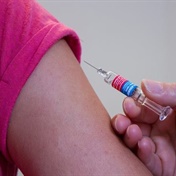
There are several serious complications that can occur in people with measles (rubeola) and complications are more likely to occur in malnourished children.
Vitamin A deficiency in particular worsens the course of the disease. This is because vitamin A is important for the protection of the skin and the mucous membranes of the eyes, respiratory tract and gut.
Measles also tends to be more severe in infants under one year and in any person who is immune-suppressed, for example due to HIV infection.
In impoverished areas of South Africa, measles used to take a high toll on children until vaccination campaigns greatly reduced the problem.
Measles-related complications include:
Croup
Croup occurs due to inflammation of the vocal cords and upper airways. With croup, difficulty in breathing air into the lungs is accompanied by a high-pitched crowing sound. Urgent medical attention is necessary because of the danger of complete obstruction of the upper airways.
Pneumonia
Pneumonia may be due to infection of the lungs with the measles virus itself. More often pneumonia is the result of added infection in the damaged airways and lung surfaces by other viruses or bacteria. Pneumonia becomes evident through rapid, difficult breathing, worsening cough and chest pain.
Middle-ear infection
Middle-ear infection is very common and is apparent from pain in the ear. This possibility should always be kept in mind in distressed infants, since they can’t communicate the site of pain.
Diarrhoea
Diarrhoea is usually mild, but in malnourished children it can be severe and prolonged, further compromising the child’s nutrition.
Conjunctivitis
Red, watery eyes result directly from the measles virus infection. This eye infection is known as conjunctivitis and is present in nearly all measles patients.
Secondary bacterial infection may also occur with measles. Bacterial infection can cause quite severe eye inflammation, which may possibly lead to scarring of the cornea with partial blindness. This is a particular risk in malnourished children, especially those who also have a vitamin A deficiency.
If a person has measles and there’s severe redness and tearing of the eyes, it’s important to see a doctor.
Tuberculosis
Measles is a serious infection and leaves the individual's immune system suppressed for some weeks to months afterwards. It’s believed that this often contributes to the flaring up or reappearance of tuberculosis in children in South Africa and other developing countries.
Herpes
An early consequence of the immune-system suppression that occurs with measles may be the development of painful mouth ulcers. These mouth ulcers are due to a herpes virus infection in the mouth. This fairly common complication is known as herpes stomatitis.
Encephalitis
Encephalitis (inflammation of the brain) occurs in about 1 in 1,000 cases of measles. The risk increases with the age of the child.
Because the encephalitis is believed to be an “allergic” type of reaction to the virus in the brain, there’s no correlation between the severity of the measles and the risk of encephalitis. Encephalitis can be a complication of even the mildest case of measles.
Encephalitis usually occurs 2-7 days after the start of the rash, when the child should be starting to recover. Symptoms are recurrence of fever, onset of headache, apathy, irritability and confusion. Some children may have seizures.
Most children recover from measles encephalitis within 2-3 days, but about one third remain comatose for days to weeks. Some children who develop measles encephalitis are left with mental retardation, deafness, paralysis or epilepsy, and a few may die.
A delayed, fatal form of encephalitis that appears weeks to months after measles can occur in immune-compromised children.
Sub-acute sclerosing pan-encephalitis (SSPE) is an extremely rare but dreaded condition, which usually occurs many years after measles infection. For unknown reasons, the virus persists in a weakened form in the brain of a very small number of people infected with measles. It eventually begins to cause degeneration in areas of the brain.
This complication usually first becomes evident with subtle changes in personality, sleep patterns and intellect (for example a fall-off in schoolwork). Other early changes are failing eyesight and repetitive jerky movements. Unfortunately, with SSPE, there’s a slow downhill progression to death in every case.
Reviewed by Prof Eugene Weinberg, Paediatrician at the University of Cape Town’s Allergy and Immunology Unit. April 2018.




 Publications
Publications
 Partners
Partners















